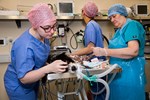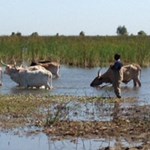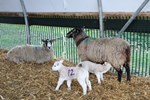Search - Research
111 - 120 of 535 results
-
New research shows Pugs have high health risks and can no longer be considered a ‘typical dog’ from a health perspective
A new study from the Royal Veterinary College suggests urgent action is needed as many health issues of Pugs are associated with their extreme body shape New research from the Royal Veterinary College (RVC) has revealed that the health of Pugs in … -
Study reveals the true risks of anaesthesia in dogs
A team of researchers at the Royal Veterinary College and the University of Manchester used data from more than 150,000 dogs in the UK to assess the risk of death from sedation and general anaesthetics. -
Kissing and petting young camels found to be key transmitter of Middle East Respiratory Syndrome Coronavirus
New research led by the Royal Veterinary College (RVC) into the spread of MERS-CoV, the virus carried by camels which causes Middle East Respiratory Syndrome (MERS), has found that young camels present a high risk for human exposure to the virus, …New research led by the Royal Veterinary College (RVC) into the spread of MERS-CoV, the virus …
-
New research from the RVC reveals reasons for antibiotic usage in Indian chicken farming
New research from the Royal Veterinary College (RVC), in collaboration with the West Bengal University of Animal & Fishery Sciences (WBUAFS), explored antibiotic use in chicken farming in eastern India, revealing how poultry companies play a …New research from the Royal Veterinary College (RVC), in collaboration with the West Bengal …
-
New RVC research reveals later-age spaying of bitches reduces risk of urinary incontinence
A new study from the Royal Veterinary College (RVC) has revealed that delaying spaying of bitches until between seven and 18 months causes a 20 percent reduction in the risk of early-onset urinary incontinence, compared with early-age spaying … -
New technologies can more effectively track freshwater snails and prevent tropical disease schistosomiasis
Google Earth, satellite images and drone photos can help identify which remote communities are most at risk of contracting one of the world’s worst tropical diseases – schistosomiasiGoogle Earth, satellite images and drone photos can help identify which remote communities are most …
-
Researchers reveal disease mechanism of the bovine TB pathogen
Researchers from The Francis Crick Institute, University College Dublin, Public Health England, APHA and the RVC shed new light on how the bacteria that cause TB in humans and animals manipulate the host immune system to cause diseaseA multidisciplinary team led by researchers from The Francis Crick Institute and including …
-
Leading the flock: The RVC launches new ‘Flockmaster’ Course to help sheep farmers increase their flock productivity and improve the health of their sheep
The Royal Veterinary College (RVC) has launched a new course for sheep farmers, shepherds, and smallholders to help them build knowledge and skills to protect and increase their flock productivity and improve the health of their sheep. Rearing …The Royal Veterinary College (RVC) has launched a new course for sheep farmers, shepherds, and …
-
New RVC research identifies changing epidemiology of harmful foetal disease
A new study from the Royal Veterinary College (RVC) highlights the changing epidemiology of congenital toxoplasmosis (CT), a foetal disease which affects approximately 190,000 pregnancies around the world each year, and the need for more extensive …A new study from the Royal Veterinary College (RVC) highlights the changing epidemiology of …
-
New study explains how fish got their fingers
New analysis of anatomical evidence shows how the limbs of land vertebrates (such as mammals and reptiles) originated from the fins of water-bound fishes.










